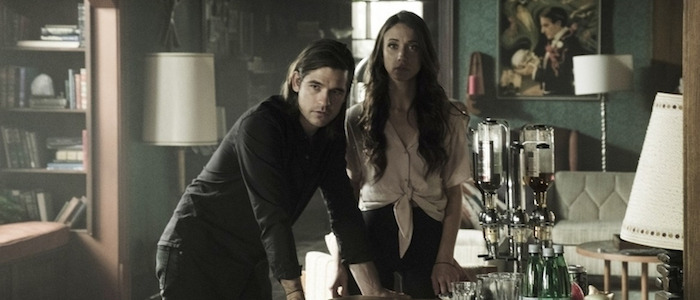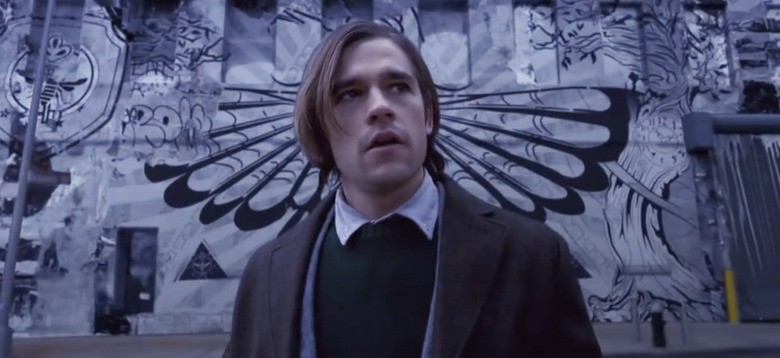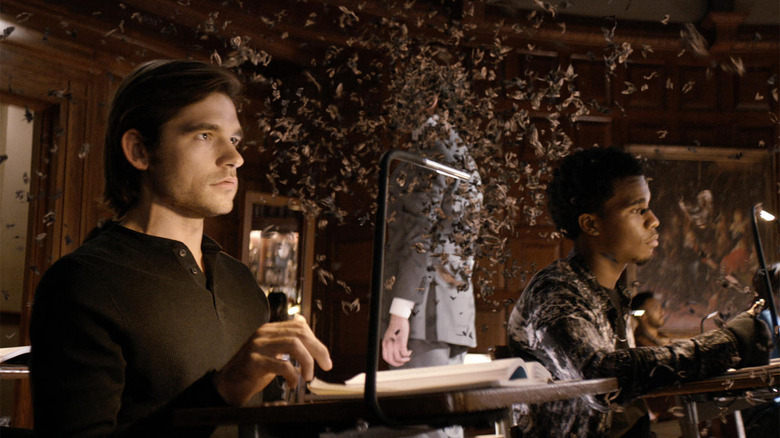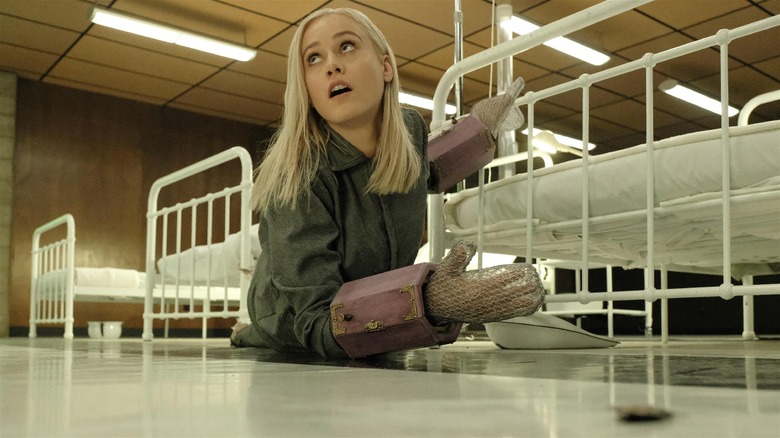'The Magicians' Is The Rare Adaptation That's Better Than The Book
"The book was better."Even without context, those four words almost work as a manifest truth, one I have immortalized on a lapel pin and engraved on my heart. The book, by virtue of its being a story's inception point, the very first version of a narrative where nothing's cut for time and no grand ideas are scuttled for budget, is almost always better than any of its adaptations. And when the SyFy network first announced they'd be adapting Lev Grossman's The Magicians trilogy, the show felt destined to become one more example of this truism. How could SyFy, with its mediocre budget and (at the time) critically undistinguished reputation, do justice to Grossman's dark, fantastical treatise on suffering and selfhood?The answer: with panache.
Origin Story
Lev Grossman published The Magicians, the first book in his trilogy, a decade ago. Critics started calling it "Harry Potter for grownups," and sure, that's an easy shorthand to discuss the books, which have 18-year-old Quentin Coldwater discovering he's a magician and being recruited to a magical college called Brakebills. Quentin starts the series seven years older than Harry is when he learns he's to matriculate at Hogwarts, and he's already suffering many of the problems that Harry doesn't even have to think about until the latter half of his own series: depression, unrequited love, inadequacy. But though a serious chunk of The Magicians follows Quentin and his classmates (the studious love of his life Alice, hotheaded Penny, imperious Eliot, mercurial Janet and chubby – he doesn't get many other descriptors here – Josh) through their five years at Brakebills, it doesn't take long for the series to become about much more than a magical school.In fact, Quentin and company graduate with hundreds of pages left to go in the first book of the trilogy, and then the story becomes a big question of "what's next?" Quentin follows his charmed years of magical education like so many of us right after college: lazily, hedonistically, aimlessly. It's both a heightened and a clear-eyed look at the quarter-life crisis, that period in our lives when we're free from the educational system but have no idea what we should or want to do next, how those years can break or change us, and most damningly, how truly boring they are.But that mid-20s tedium, as interminable as it may feel while one's drowning in it, doesn't last forever. Near the end of The Magicians, Quentin discovers that Fillory, the fantasy land featured in the supposedly fictional books he obsessed over as a kid, is real. The rest of the series follows Quentin and his friends as they struggle to protect Fillory and Earth from challenges both mundane and magical.
The Characters
So what makes the television series better than the novels, an almost sacrilegious statement among bookworm circles? Grossman writes Quentin with a remarkable amount of nuance and texture. Quentin's a bit of a mopey asshole, yes, but he's a wholly actualized character, rich with motivation and color. He's also the only character in the entire series we can describe that way. Everyone else is seen through Quentin's myopic perspective, especially when it comes to the women in his life. While Grossman attempts to give us peeks into Julia and Alice's points of view, both are wan reflections of humanity next to the messy reality of Quentin. Josh, Eliot, Janet and Penny feel even less realized. Julia, Quentin's childhood friend and first love who isn't accepted into Brakebills and therefore forges her own formidable path, is raped (by a trickster god, no less) in the second book of the series, The Magician King, and the rather pat way the author uses this trauma to define Julia for the rest of the series feels like an injustice to the character.Under show creators John McNamara and Sera Gamble, The Magicians is a true ensemble, peopled by complex and fascinating characters who carry every bit as much weight as Quentin, if not more. Jason Ralph is indisputably great in the lead role, carrying Quentin from his pitiful Nice Guys Finish Last years into something far more interesting, but he never steals focus from the women in his life, all of whom have their own lives, their own plans and inducements. Stella Maeve is both dark and light as Julia, who never takes no for an answer, never accepts what she can confront, and while the show's Julia also suffers sexual assault by Reynard the Fox, her story becomes about so much more. There's a reckoning for Julia, and she makes choices that aren't about her trauma but about her, what she wants, who she is, who she wants to be.Alice is the most well-written non-Quentin character in the books, but she's still framed as his prize, his regret and his redemption, and on the show, she's much more. She's angry and focused, powerful, talented, vulnerable, good. Olivia Taylor Dudley has an internalized fierceness that never feels put-upon or performed, and she gives Alice an almost frightening strength at times. Janet's a lot of nothing in the book, and in the series, she's renamed as Margo (with a few winks to her source material name), and thanks to Summer Bishil, she's reborn, too, as one of the best characters on television: loyal and terrifying, hilarious, brilliant, at once glamorous and foul-mouthed. Jade Tailor's Kady doesn't even exist in the books, though her closest corollary is probably the two-dimensional Poppy, but on the show she's crucial, the one person who understands Penny, who doesn't buy into Brakebills and Fillory as the end-all and be-all of existence.Even the women who aren't cast regulars offer more substance than even leading characters on other shows, like Kacey Rohl as Marina, and Mageina Tovah as The Librarian. And Hale Appleman's Eliot, Arjun Gupta's Penny and Trevor Einhorn's Josh dance circles (sometimes literally) around their book counterparts. They're all so funny and tragic, wonderful and awful, and most importantly, they're real. And not for nothing: just about every character is lily-white in Grossman's books, while SyFy's The Magicians boasts a beautifully diverse cast. Dean Fogg is described as portly, balding and quite pasty in Grossman's world; in McNamara and Gamble's, he's played by the wildly compelling Rick Worthy. Everyone here is simply more interesting than they ever were on the page, Quentin included, and that's nothing less than a triumph for a small screen adaptation of a beloved trilogy.
The Tone
So much of The Magicians' success, outside of these performances and these characters, is due to tone. While there's a wry deprecation running through Grossman's books, they ultimately take themselves rather seriously, carrying a heavy weight that the television series shrugs off early on. The show is delightful and frothy but never flimsy. Every episode is peppered with pop culture references, nods to its spiritual predecessors Buffy and Game of Thrones and even Battlestar Galactica that stand starkly against the classical fantasy backdrop of Fillory. There's a moment in Season 3 where Margo and Eliot are speaking in code around a fairy queen (brilliantly cast as Candis Cayne) who's been spying on them, and the ease with which they drop earthly pop culture scenarios to describe their plight is worth about a dozen rewatches.This show is just so hugely funny, thanks to Eliot's archness, Margo's raunch, Josh's debauchery, and the fantastical talking creatures and weirdo citizens of Fillory who drive our Earth friends bananas. But it's also deeply kind – to its characters and its viewers. Through Julia and Alice, the series examines trauma. Through Eliot and Quentin, it discusses depression. Grief and identity and guilt and love are all measured equally. Penny and Josh and Kady and Margo each humanize that all-too-real feeling of being forever on the outside, but The Magicians refuses to keep them on the outs. This story has too much compassion for its characters for anyone to feel like an outsider, like an other, for long. All of these characters – villains, talking animals, victims of sexual assault and mopey assholes alike – are given the opportunity to be taken seriously, to be heard and felt and seen.It's gorgeous, too, from Brakebills' classicism to Fillory's rainbow-drenched, outdoorsy whimsy. The series achieves a phenomenal amount of visual grace though lacking HBO's budget, and the magic always feels like magic, from small tricks to dimension-shattering exploits. (And volumes could be written about Margo's fashion as High Queen of Fillory.) The Magicians has its own weird alchemy where it looks and sounds and feels familiar, but also like nothing so much as itself. It created its own world and inhabits it so cozily that it feels like we've all been visiting there forever. Only the best fantasy does that – Narnia, Middle-earth, Mid-World, Hogwarts and now Fillory.
The Path
Like Game of Thrones before it, The Magicians became more interesting when it diverged from the path that created it. While some of the currently airing fourth season is recognizable from the books, we're on a new path now, a bold new quest where anything can happen and all bets are off. There's one notable quality The Magicians shares with The Good Place (one of the other best shows on television), in that every season resets itself, wipes the slate clean and puts our characters in brand new scenarios that are shockingly disconnected from where they just were – but without ever losing the import of previous seasons. Everything has weight on The Magicians, even the stuff our characters can't remember anymore, because we remember it, and the story remembers it. The writers treat us, treat their characters and treat this story with so much care and respect, taking episodes that could feel like a gimmick – a musical episode, an episode where a character is dead and trying to communicate with his still-living friends, the episode where we see Quentin and Eliot live an entire life together before bouncing back to the current timeline – and making them significant. The Magicians celebrates and takes full advantage of the limitless possibilities inherent in fantasy storytelling, but always with one goal: to help these characters grow, learn, love and relate to one another, and to help us relate to them, too.Lev Grossman forged this world, and he did it beautifully. But McNamara and Gamble have shaped it into something boundless and ever-changing, a breathing and living gift to those of us who loved the books, and to those who never even heard of Fillory until it popped up on our TV sets fully formed one day.




